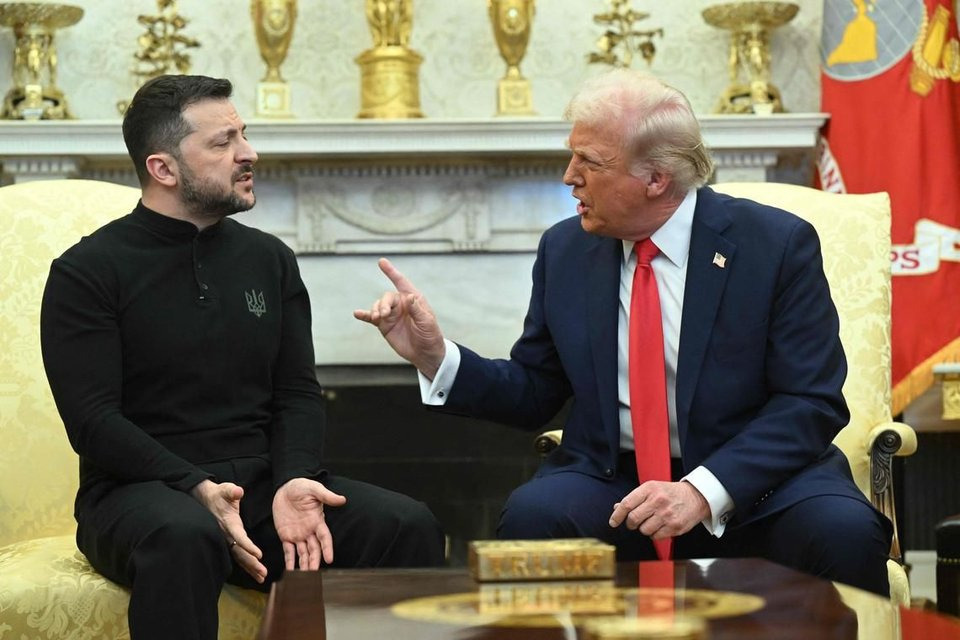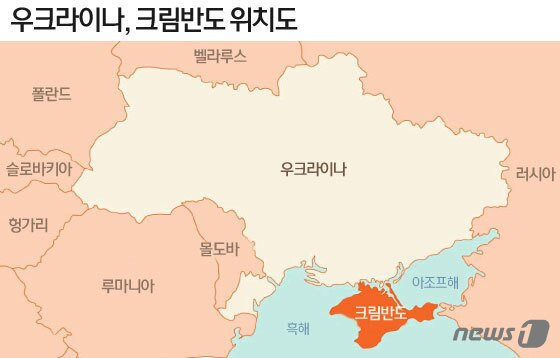국제 정세의 중심에서 미국 대통령 도널드 트럼프와 우크라이나 대통령 볼로디미르 젤렌스키가 크림반도 문제를 놓고 심각한 갈등을 빚고 있습니다. 이 갈등은 단순한 영토 분쟁을 넘어 국제법, 국가 주권, 그리고 전쟁과 평화의 균형에 대한 근본적인 질문을 던지고 있습니다.

무엇이 문제인가?
트럼프 행정부는 최근 러시아-우크라이나 전쟁을 종식시키기 위한 '최종 제안'으로 미국이 크림반도를 러시아 영토로 공식 인정하는 내용이 포함된 평화안을 제시했습니다^10. 이에 대해 젤렌스키 대통령은 단호하게 거부 의사를 표명했습니다. "이야기할 것이 없습니다. 이는 우리 헌법을 위반하는 것입니다. 이것은 우리 영토이고, 우크라이나 국민의 영토입니다."라고 그는 분명히 밝혔습니다^5.
이러한 젤렌스키의 반응에 트럼프는 강하게 반발하며 젤렌스키가 "평화 협상에 매우 해롭다"는 주장을 펼쳤습니다^2. 트럼프는 자신의 소셜 미디어 플랫폼 'Truth Social'에 "젤렌스키가 전쟁터를 연장시키고 있다"며 비난하는 글을 올렸습니다^3.

역사적 맥락: 크림반도 위기
사실 크림반도 문제는 2014년으로 거슬러 올라갑니다. 당시 러시아는 크림반도를 침공하여 합병했으며, 이는 국제사회로부터 불법 행위로 규탄받았습니다^5. 트럼프는 "크림반도는 오바마 대통령 시절에 이미 잃어버린 땅"이라고 주장하지만^2, 실제로는 러시아의 무력 점령이 있었으며 적어도 한 명의 우크라이나 군인이 사망하고 많은 이들이 구금되거나 폭행당했다는 사실이 있습니다^5.
중요한 사실: 젤렌스키 대통령은 2014년 크림반도 합병 당시 우크라이나 대통령이 아니었습니다. 그럼에도 트럼프는 "왜 11년 전에 러시아에 총 한 발 쏘지 않고 넘겨줬을 때 싸우지 않았냐"며 젤렌스키를 비난했습니다^7.

트럼프의 '평화안'
트럼프 행정부가 제안한 평화안의 주요 내용은 다음과 같습니다:
- 크림반도에 대한 미국의 "법적(De jure)" 러시아 통제권 인정
- 루한스크 지역 대부분과 도네츠크, 헤르손, 자포리자 점령 지역에 대한 "사실상(De-facto)" 러시아의 통제 인정^10
트럼프는 이를 자신의 "최종 제안"이라고 표현하며, 빠른 시일 내에 합의가 이루어지지 않으면 중재자 역할에서 물러날 수 있다고 위협했습니다^11.
우크라이나의 반응
우크라이나 정부 관계자들은 이 제안이 "러시아에 매우 편향되어 있다"고 보고 있습니다^10. 한 소식통은 "이 제안은 러시아가 얻는 실질적인 이득에 대해서는 매우 명확하게 말하고 있지만, 우크라이나가 얻을 것에 대해서는 모호하고 일반적으로만 언급하고 있다"고 지적했습니다^10.
우크라이나 국회의원 볼로디미르 아리에프는 크림반도 합병을 인정하는 것은 위험한 선례를 만들 수 있으며, 광범위한 분쟁을 초래할 수 있다고 경고했습니다^9. 그는 "우크라이나는 제2차 세계대전 이후 확립된 기본 원칙을 훼손하려는 세력과 연합해서는 안 된다"고 강조했습니다^9.
백악관의 입장
백악관 대변인 캐롤라인 레비트는 "대통령은 좌절감을 느끼고 있으며, 그의 인내심이 점점 줄어들고 있다"고 말했습니다^13. 또한 "만족스러운 합의를 이루기 위해서는 양측 모두 테이블을 떠날 때 일부 불만을 가져야 하지만, 안타깝게도 젤렌스키 대통령은 이 평화 협상을 공개적으로 논쟁하려고 시도하고 있다"고 비판했습니다^13.
이번 갈등의 더 넓은 맥락
이번 갈등은 2025년 2월 백악관에서 있었던 트럼프와 젤렌스키의 이전 만남에서 비롯된 것으로 보입니다. 당시 회의는 언론 앞에서 대립으로 악화되었습니다^13. 일부 분석가들은 이 만남이 "트럼프 행정부에 의해 사전에 계획된 결과"였으며, 우크라이나에 대한 모든 지원을 철회하기 위한 과정의 시작이었다고 주장합니다^1.
이후 트럼프 행정부는 우크라이나에 대한 군사 원조를 중단하고 실시간 정보 제공을 차단했다는 보고가 있습니다^6. 이는 러시아가 우크라이나 군대를 쿠르스크 지역에서 몰아내는 데 성공한 시기와 맞물립니다^6.
국제사회의 반응
크림반도의 러시아 영토 인정은 10년간의 초당적 미국 정책과 2014년 유엔 총회 결의안을 뒤집는 것이며, 당시 100개 회원국이 합병을 불법이라고 선언했습니다^5. 크림 타타르인의 대표기구인 메질리스의 의장 레파트 추바로프는 크림반도의 러시아 영토 인정에 강력히 반대하고 있습니다^5.
이것이 주는 교훈
이 분쟁은 단순한 외교적 마찰을 넘어 국제 질서에 대한 근본적인 도전을 제기합니다. 무력으로 점령한 영토를 인정하는 것은 다른 국가들도 유사한 행동을 취할 수 있는 위험한 선례를 만들 수 있습니다^8.
또한 이 갈등은 국제 관계에서 역사적 맥락과 사실관계의 중요성을 보여줍니다. 트럼프가 젤렌스키에게 2014년 크림반도 방어를 하지 않았다고 비난한 것은 당시 젤렌스키가 대통령이 아니었다는 사실을 간과한 것입니다^7.
앞으로의 전망
현재 상황에서 트럼프 행정부와 젤렌스키 정부 간의 갈등은 더욱 고조될 가능성이 있습니다. 트럼프는 "그(젤렌스키)는 평화를 선택하거나, 3년 더 싸워 나라 전체를 잃을 수도 있다"며 압박을 가하고 있습니다^5.
이에 대해 유럽 국가들은 우크라이나를 지지하기 위해 단결하고 있다는 보고가 있지만^4, 과연 이것이 1,103일 동안 지속된 분쟁을 어떻게 변화시킬지는 불확실합니다.
트럼프 행정부의 평화안이 우크라이나에 어떤 실질적인 보장을 제공하는지, 러시아는 이에 어떻게 반응할지, 그리고 국제사회는 이 위기에 어떻게 대응할지 지켜볼 필요가 있습니다.
이 복잡한 상황은 국제 관계에서 힘의 논리와 법적 원칙 사이의 긴장, 그리고 전쟁과 평화 사이의 어려운 선택을 보여주는 중요한 사례가 되고 있습니다.
#국제정치 #트럼프 #젤렌스키 #우크라이나전쟁 #크림반도 #러시아 #외교갈등 #국제법 #평화협상 #영토분쟁 #지정학 #국제관계 #백악관 #주권 #평화협정
Trump vs. Zelensky: Diplomatic Clash Over Crimea
At the center of the international political stage, U.S. President Donald Trump and Ukrainian President Volodymyr Zelensky are embroiled in a serious conflict over the Crimean Peninsula. This dispute extends beyond a mere territorial disagreement, raising fundamental questions about international law, national sovereignty, and the balance between war and peace.
What's the Issue?
The Trump administration recently presented a peace proposal to end the Russia-Ukraine war, which includes the United States formally recognizing Crimea as Russian territory as part of their "final offer"^10. President Zelensky firmly rejected this proposition, stating: "There is nothing to talk about. This violates our Constitution. This is our territory, the territory of the people of Ukraine."^5
In response to Zelensky's reaction, Trump strongly pushed back, claiming that Zelensky was being "very harmful to the peace negotiations"^2. Trump posted on his social media platform 'Truth Social,' accusing Zelensky of "prolonging the killing field"^3.
Historical Context: The Crimean Crisis
The Crimean issue dates back to 2014 when Russia invaded and annexed the peninsula, an action condemned as illegal by the international community^5. While Trump claims that "Crimea was lost years ago during the Obama administration"^2, there was in fact a forceful Russian occupation that resulted in the death of at least one Ukrainian soldier and the detention or assault of many others^5.
Important fact: President Zelensky was not the president of Ukraine during the 2014 annexation of Crimea. Nevertheless, Trump criticized him, asking, "why didn't they fight for it eleven years ago when it was handed over to Russia without a shot being fired?"^7
Trump's "Peace Plan"
The key elements of the Trump administration's peace proposal include:
- "De jure" U.S. recognition of Russian control over Crimea
- "De-facto recognition" of Russia's occupation of nearly all of Luhansk oblast and the occupied portions of Donetsk, Kherson, and Zaporizhzhia^10
Trump has described this as his "final offer" and threatened to withdraw from his role as mediator if an agreement isn't reached quickly^11.
Ukraine's Response
Ukrainian government officials view this proposal as "highly biased towards Russia"^10. One source noted, "The proposal says very clearly what tangible gains Russia gets, but only vaguely and generally says what Ukraine is going to get"^10.
Ukrainian MP Volodymyr Ariev warned that recognizing Crimea's annexation could create a dangerous precedent that might lead to widespread conflicts^9. He emphasized that "Ukraine should not align with those looking to undermine the fundamental principles established after World War II"^9.
The White House Position
White House Press Secretary Karoline Leavitt stated, "The president is feeling frustrated; his patience is diminishing"^13. She also criticized Zelensky, saying, "To achieve a satisfactory agreement, both parties must leave the table with some dissatisfaction, and unfortunately President Zelensky has been attempting to litigate this peace negotiation publicly, which is unacceptable to the president"^13.
The Broader Context of This Conflict
This conflict appears to stem from a previous meeting between Trump and Zelensky at the White House in February 2025. That meeting deteriorated into a confrontation in front of the media^13. Some analysts suggest that this meeting had a "preordained outcome orchestrated by the Trump administration" and was the beginning of a process to withdraw all support from Ukraine^1.
There are reports that the Trump administration subsequently suspended military aid to Ukraine and cut off real-time intelligence sharing^6. This coincided with a period when Russia successfully drove Ukrainian troops out of the Kursk region^6.
International Reaction
Recognizing Crimea as Russian territory would reverse a decade of bipartisan U.S. policy and a 2014 United Nations General Assembly resolution, in which 100 member states declared the annexation illegal^5. Refat Chubarov, chairman of the Mejlis, the representative body of the indigenous Crimean Tatar people, strongly opposes any international recognition of Crimea as Russian territory^5.
Lessons from This Dispute
This conflict poses a fundamental challenge to the international order beyond mere diplomatic friction. Recognizing territories occupied by force could set a dangerous precedent for other countries to take similar actions^8.
The dispute also highlights the importance of historical context and factual accuracy in international relations. Trump's criticism of Zelensky for not defending Crimea in 2014 overlooks the fact that Zelensky was not president at that time^7.
Future Outlook
In the current situation, tensions between the Trump administration and the Zelensky government are likely to escalate further. Trump is putting pressure on Zelensky, saying, "He can have peace, or he can fight for another three years before losing the whole Country"^5.
There are reports that European countries are uniting to support Ukraine^4, but it remains uncertain how this will change a conflict that has lasted 1,103 days.
It will be essential to monitor what concrete guarantees the Trump administration's peace plan offers to Ukraine, how Russia will respond, and how the international community will address this crisis.
This complex situation exemplifies the tension between power politics and legal principles in international relations, as well as the difficult choices between war and peace.
#InternationalPolitics #Trump #Zelensky #UkraineWar #CrimeaPeninsula #Russia #DiplomaticConflict #InternationalLaw #PeaceNegotiations #TerritorialDispute #Geopolitics #InternationalRelations #WhiteHouse #Sovereignty #PeaceAgreement
#국제정치 #트럼프 #젤렌스키 #우크라이나전쟁 #크림반도 #러시아 #외교갈등 #국제법 #평화협상 #영토분쟁 #지정학 #국제관계 #백악관 #주권 #평화협정
'이슈 > 국제' 카테고리의 다른 글
| 호주, 그 특별한 대륙: 세계에서 가장 독특한 나라의 모든 것 (0) | 2025.04.26 |
|---|---|
| 북한 신형 구축함 '최현함' 진수식, 김정은 참석으로 주목받아 (0) | 2025.04.26 |
| 카슈미르 분쟁: 인도와 파키스탄 사이의 오랜 갈등 (0) | 2025.04.24 |
| 중국 차세대 배터리 산업의 미래: 전고체 배터리와 글로벌 패권 경쟁 (0) | 2025.04.24 |
| 트럼프도 두려워한 '채권 자경단'의 위력, 관세폭탄을 막아내다 (1) | 2025.04.24 |



